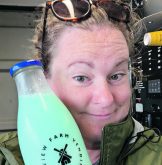Q: I attend Al-Anon because of my wife’s alcoholism, and someone at a meeting was talking about the importance of boundaries. What did she mean?
A: To understand boundaries, try to imagine that you have a small picket fence surrounding you. The fence has a gate. You can control the gate, opening it when you want to let people into your life and closing it when you would prefer some moments of privacy.
People who best understand boundaries know they can open and close their gates when they need to. People who struggle with boundaries have lost control of their gates. They do not close their gates when needed, depriving themselves of privacy and falling victim to the whims of those who they love the most.
Read Also

Rural Manitoba resources slim on natural disaster planning
A study from Brandon University’s Rural Development Institute has found that many rural and small municipalities don’t have the staff or resources to make formal climate plans against natural disaster.
Alcoholics, drug addicts or almost anyone who has addictions in their life are particularly bad at respecting other people’s boundaries. They just charge right on through the gates of their parents, their spouses, their lovers or their children, showing little or no regard for those who love them.
What they show others is a fairly lengthy list of inordinate demands and threats of physical, verbal and emotional abuse, keeping their loved ones, who are now their victims, in tow.
Your new friends in Al-Anon are asking you to consider closing the gate to your fence and not letting your addicted wife into your life when she is impulsively abusing alcohol and abusing you or your children.
Just say “no”. Sounds simple but it isn’t, and that is why we have organizations such as Al-Anon to support you through difficult times.
The good news is that as you practise saying “no” to your wife, to closing those emotional gates protecting you and your children, life can get better. And, who knows, maybe some day your wife will agree to treatment for her disease.
Jacklin Andrews is a family counsellor from Saskatchewan. Contact:jandrews@producer.com.















